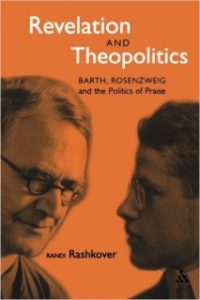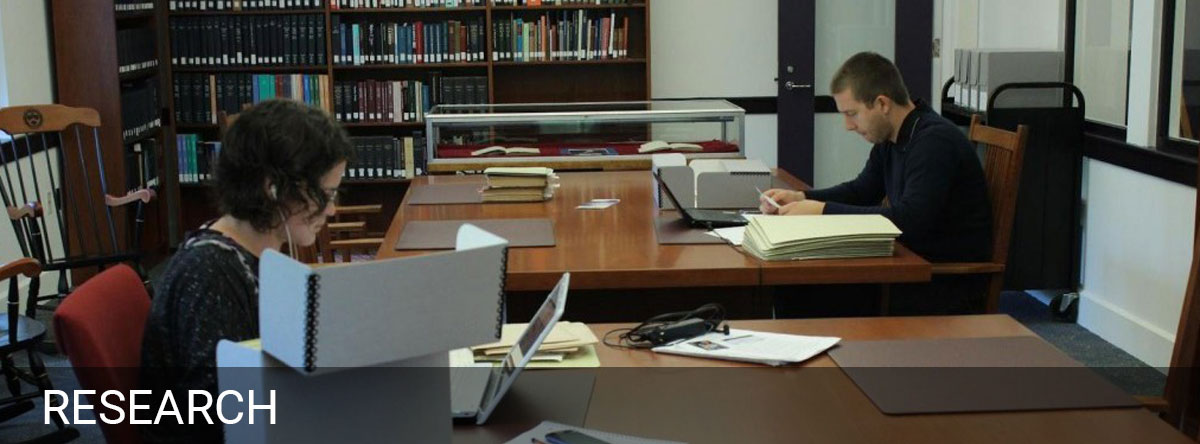 Rashkover, Randi. Revelation and Theopolitics: Barth, Rosenzweig and the Politics of Praise (New York: T&T Clark, 2005), 215 pp. $80.95 (paperback).
Rashkover, Randi. Revelation and Theopolitics: Barth, Rosenzweig and the Politics of Praise (New York: T&T Clark, 2005), 215 pp. $80.95 (paperback).
Reviewed by Zacharie Klassen (February 21, 2017)
Published in 2005, Randi Rashkover’s Revelation and Theopolitics no doubt occupies an important place in the increasing Jewish engagement with the works of Karl Barth. Indeed, Rashkover’s more recent Freedom and the Law: A Jewish-Christian Apologetics (Fordham, 2011) extends some of her engagement with Barth in Revelation and Theopolitics to a treatment of Barth on the law. As the full title of the book here being reviewed suggests, however, this book is not principally about Karl Barth. Rather, the book offers a comparative reading of the Jewish theologian Franz Rosenzweig and the Christian theologian Karl Barth as presenting what Rashkover calls a “theology of testimony” that could support “a philosophically justified theopolitics” for Jewish and Christian communities in an age where the question of the role of religion in the public square continues to vex many (3).
According to Rashkover, a theology of testimony is built on the assumption that “knowledge of God is possible only in the context of the ethical labor of the elect individual who seeks through her moral endeavor to testify to the loving act of the transcendent God” (3). Rashkover is fully aware of how the language of knowing God through “ethical labor” may be interpreted as repeating certain Kantian ideas about God as being the rationally necessary “postulate” for ethics (22), as well as his affirmation of the moral autonomy of the individual. To show that there is a concrete relation to Kant in her analysis, but also to show that Kant’s ideas are not the foundation for a theology of testimony, Rashkover spends the first chapter analyzing the neo-Kantian Hermann Cohen, noting Rosenzweig and Barth’s “shared inheritance” of his thought (9). While this chapter includes some of the most challenging material of the book, a close reading is rewarding and important for understanding how Rashkover reads Rosenzweig and Barth to both inherit and improve upon Cohen’s thought. Rashkover notes that Cohen took Kant’s categories of critical idealism and did what Kant was never willing to do, namely, to apply the categories to religion or revelation and specifically to the sources of Judaism (14). By doing this, Rashkover claims that Cohen improved upon Kant in two ways.
First, Cohen was willing to develop assertions regarding God that went beyond Kant’s appeal to God as mere cause of the created order. This led him to conceive of the concept of “correlation,” which Rashkover interprets as the relation, begun in God’s act of revelation, “between God as the origin of reason and a human’s response to this revelation by means of her employment of that reason” (18). Developing the concept of correlation in relation to the biblical language of God’s holiness, Cohen then claimed that God was not only the postulate that made ethical action rational, but also the pre-condition and model of human morality (22-23). Called to be holy, human beings must “emulate” God through moral action and in doing so show themselves to know God only through “acknowledgement” of and devotion to God (24). Second and following from the above, Rashkover notes that Cohen’s principle example of correlation is divine forgiveness and grace, topics that Kant refused to give weight due to their potential for undermining the freedom and autonomy of the rational individual to act (30). While these two moves beyond Kant are promising in Rashkover’s view, in that they turn with seriousness towards religious sources, she finally claims that Cohen’s advance is only partial, since he still requires that Jewish sources fit the idealistic constrains of ‘ethics’ and ‘reason’ rather than letting the sources determine what counts for ethics and reason.
Turning to an analysis of Rosenzweig and Barth in the subsequent four chapters, Rashkover demonstrates how these two figures prioritize religion or revelation in their accounts of ethics. In the second chapter, Rashkover points out that, contrary to Cohen, Rosenzweig’s account of revelation in The Star of Redemption “does not have any conceptual referent” (59). Revelation, for Rosenzweig, is always the “act” of the transcendent God and as such it is consistently out of the grasp of idealistic possession. Reading The Song of Songs, Rosenzweig argues that God’s revelation is the revelation of God’s “unconditional and commanding” act of love for the beloved, which is also the election of the beloved (60). Being so elected by the transcendent God, the beloved simultaneously finds herself called to acknowledge this love while having no possession of it such that she could simply re-present it through reason. Furthermore, finding herself loved, she acknowledges a time without that love – the time of sin (62). Experiencing this love but also recognizing sin, the beloved is now called to testify to the God she desires and who is absent. Here Rashkover sees the significant improvement on Kant (as well as Cohen) being Rosenzweig’s appeal to “theological desire” as the basis for epistemology and ethics rather than the “postulate of God” as “rational need” (66).
The appeal to “theological desire” here may sound like a return to Schleiermacher, but in the third chapter Rashkover shows how this is not the case by treating what she calls Rosenzweig’s “philosophically plausible theology of the Word of God” (77). There she argues that, for Rosenzweig, desire for the transcendent God can be testified to in human language without reducing revelation to the subjective experience of the religious individual since a philosophical analysis of language shows that language “suggests transcendence without objectifying it” (80). In other words, rather than just testifying to a subjective experience, Rosenzweig understands language to be expressive of reality. The Word of God does not consist of particular words or propositions then, but must be understood as supplying a language for “the experience of divine revelation and command” and “the human response to this experience…” (90). The human experience and response to the divine revelation and command demonstrate, however, the dialectical character of the Word of God in that language itself expresses “language’s inability to describe…the Other” (92). This does not mean that the human response has only a negative function, for the positive function of human response is also displayed when theological desire translates into love of neighbor (99).
In chapters 4 and 5, Rashkover turns to an analysis of Barth’s Epistle to the Romans and selections from the Church Dogmatics (hereafter ER and CD respectively), arguing that Barth’s account of “theological knowledge . . . is structurally the same” as Rosenzweig’s (120). In fact, Rashkover argues that the account of revelation given by Cohen, Rosenzweig and Barth are similar in that all affirm revelation as the means by which human beings come to knowledge of God. For the Barth of ER, however, this knowledge is possible “only by an act of God’s grace through which God lovingly displays his righteousness and commands us to obedience . . . ” through the cross and resurrection (124). By way of this “love-command” structure, Rashkover rightly understands Barth to be articulating a theology of “divine election.” The elect individual, however, can only experience the revelation of God’s love and command as a judgment of the reality of sin and so the negation of the present world. Pointing out a difference between Rosenzweig and Barth here, Rashkover notes that, for Barth, in ER “the redemption afforded in revelation does not pertain to or have any positive effect on our current world” but must find expression only in “the new world” (128). As a result, the only way a believer testifies ethically to God is through repentance (130). In order to draw out any kind of “positive praise of God” from Barth’s writings, Rashkover claims that one needs to turn to his account of revelation in the CD where she claims Barth provides an alternate picture of “the form of the divine act of revelation” even as he remains committed to a dialectical account of that revelation (138). According to her, the Christology in CD II/2 provides an account of positive testimony in that there Barth declares Jesus Christ, the Word of God, as not only the basis for knowledge of God, but also as the visible “basis for ethical life” (152). The incarnation is “the site of positive testimony to God” whereby human beings are able to see “a portrait of the elected human being who positively loves and participates in the glory of God” (155). While human beings cannot realize the perfect testimony to God’s love that Jesus embodied, they can nonetheless “enact obedience and practical testimony to God in this world” through love of neighbor (159).
In the final chapter, Rashkover develops what she calls a “politics of praise” whereby covenantal communities like Judaism and Christianity can testify to God’s love through “the prophetic call of proclamation and critique, and the cry for justice” in the political sphere (171). Both of these elements, as Rashkover sees it, have been sorely hampered by “Constantinianism” on the one hand and modernity’s “church-state divide” on the other (172-173). Due to the dialectical character of their respective theologies of testimony, both Rosenzweig and Barth see testimony as a prophetic critique of human political realities (including those of religious communities) that attempt to secure the needs of a people at any cost (174). For Rosenzweig this came to expression in his critiques of certain strands of liberal Jewish tradition that too closely allied Judaism and the state and in Barth through his involvement in the Confessing Church. These examples show, for Rashkover, that a theology of testimony does not preclude religious communities from involvement in any form of ethical or even legal expression in the pursuit of justice, but it does mean that the form of expression will always be held in tension with the recognition of its own dialectical character as testimony and never as stable norm or dogma.
There is much to commend in this book. Beyond helpfully demonstrating the shared relationship between the thought of Hermann Cohen, Rosenzweig, and Barth, Rashkover has developed a framework for thinking about Jewish and Christian political engagement that should enrich ongoing work in this area. For readers unfamiliar with the Jewish authors and concepts being explored, this work will provide a helpful (although challenging!) introduction. In such a short review, much was left out that readers would also benefit from attending to, such as Rashkover’s take on the debate over Barth’s so-called turn to analogy the CD, as well as a surprising and helpful engagement with philosopher Gillian Rose in the last chapter.
Zacharie Klassen, Ph.D. Candidate, McMaster University
The views expressed here are strictly those of the author; they do not necessarily represent the views of the Center for Barth Studies or Princeton Theological Seminary.


